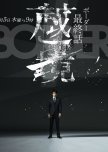BORDER appears a touch late to the paranormal party popularized last year. We have met many “medium” protagonists since then. There have even been one or two ghost-seeing detectives, such as those depicted in Who Are You and the aptly titled Ghost-Seeing Detective Cheo Yong. But while this drama initially comes across as little more than the last gasp of a dying trend, it’s much better than that. You see, BORDER might be the first good paranormal procedural we’ve been treated to in ages.
As viewers are often reminded by the stylish introduction to each episode, Detective Ishikawa Ango walks the “border” between life and death. A mistake on the job lands him with a bullet lodged in his brain and a difficult decision to make: have surgery or leave it? BORDER begins when Ishikawa puts off the decision and returns to work. Each episode covers a different case, complete with a unique death and its matching ghost. Our hero interacts with the spirits and lines up what they have to say with the facts; oftentimes, the victim is even able to tell him who has done what. Though one might worry this takes away from the mystery, enough twists and turns are thrown in to keep things interesting.
Like with most procedurals, not all crimes are created equal. Some episodes are stronger than others, with the most uneven occurring smack dab in the middle. I did like that not every victim was likable or even a particularly good person; it allowed the story to go in different directions than expected. There was also a double-meaning in the word “border,” which factors in as added complexity to the theme.
BORDER struggles most because of its predilection for exposition. Even at the start, we zip right through the “how” of Ishikawa’s powers came to be. Only a few moments pass before he’s tossed into his first case. Case denouements come across as spoon-feeding at times, or like a snippet from a script outline. A good example can be seen in an entire character: our female coroner. She is described rather than developed, tending to speak in sentences full of exposition. When the narrative stands on its own legs with a bit more subtlety (as in the seventh case) this drama watches much better. Plus, the ending simply screams for a sequel which might be good or bad depending on the viewer.
Perhaps the greatest strength of BORDER rests in its solid atmosphere. Cold colors and dark lighting work to build a flawless mood which goes unshaken for the duration of the series. Famous composer Kawai Kenji lends his talents to the soundtrack, resulting in many instances of eeriness and memorability. There are few vocals as expected, but what we get is great (such as the theme evils fall by MAN WITH A MISSION). I particularly enjoyed the creepy choral theme which plays from time to time. However, the scope of music is a touch limited—it might get repetitive for some viewers.
Unfortunately, few cast members are of note. We have Oguri Shun who is gripping as Ishikawa, despite how stoic and lifeless the character ought to be. In one early scene, the character describes his life as waiting for the next big case—with little else worth mentioning. As time goes on and Ishikawa develops more, this talented actor gets more room to stretch his wings. He is particularly impressive in the last few episodes, where more range is necessary. The other performances are forgettable, with the exception of certain guest stars and those strange little hackers (Nomaguchi Toru and Hamano Kenta).
Vond je deze recentie nuttig?























